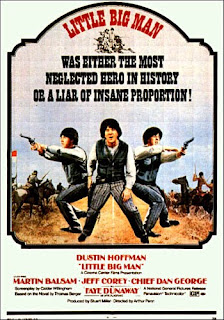Little Big Man
 This month contains the fortieth anniversary of an old favorite of mine, Little Big Man, directed by Arthur Penn. It's one of those movies that I share an affection for with my father. After watching it yesterday I called him up and we went over some of the great lines of the film, like "My heart soars like a hawk," "It is a good day to die," and "Sometimes the magic works, sometimes it doesn't."
This month contains the fortieth anniversary of an old favorite of mine, Little Big Man, directed by Arthur Penn. It's one of those movies that I share an affection for with my father. After watching it yesterday I called him up and we went over some of the great lines of the film, like "My heart soars like a hawk," "It is a good day to die," and "Sometimes the magic works, sometimes it doesn't."Those lines are all spoken by Chief Dan George as Old Lodge Skins, the Cheyenne chief. He steals the movie from Dustin Hoffman, who appears in every scene as Jack Crabb, who led a picaresque life through the Old West. When we first see him he's 121-years old (Hoffman wears some pretty nifty makeup and speaks in a rasp he got by screaming for an hour or two). He's being interviewed in an old-age home by a historian (William Hickey) on Crabb's life spent living among the Plains Indians. When Hickey suggests that Crabb's stories about Custer and the Little Bighorn are "tall tales," Crabb sets the record straight.
His parent killed by Pawnee while crossing the plains, Crabb is taken in by the Cheyenne, and comes to know Old Lodge Skins as "grandfather." But over the years he moves back and forth from Indians to whites, never quite fitting in with either. He spends some time in the home of a minister and his horny wife (Faye Dunaway), apprentices to a snake-oil salesman (Martin Balsam), and tries his hands at being a gunfighter, known as The Soda-Pop Kid, when he meets Wild Bill Hickok.
Then he gets married to a Swedish woman and opens a store, but when it goes out of business the couple head further west. She is kidnapped by Indians and he becomes a mountain man, looking for her. Eventually he is accepted back into the Cheyenne, and figures he will stay there, married to four women, until the camp is wiped out by Custer's Seventh Cavalry (a historical amalgamation of the Battle of Washita and the Sand Creek Massacre). Seeking revenge, Crabb takes a job with Custer as a scout, and is present at the Last Stand.
Little Big Man works on two levels: as a panoramic popular history of the Old West, and as something unique to 1970. It is without a doubt meant to depict parallels to Vietnam, with the indigenous represented as true and good and the white man as interloper. It also completes the gradual process that film Westerns were taking toward changing attitudes regarding Indians. By 1970, with this film and Soldier Blue, the Indians were the sympathetic heroes, and the white soldiers the bad guys. Richard Mulligan's portrayal of Custer is as a pure villain--vain and insane. Custer's legacy as a hero had been nurtured by his widow, who lived until the 1930s, but by the time of this film it was completely gone.
This film also came at a time when the American Indian was romanticized, perhaps too much so, by the counterculture. Old Lodge Skins, as a great a character as he is, is sort of the Indian version of the twinkly Irishman--a font of aphorisms and avuncular charm. We don't actually see much of him leading his people, mostly he offers pithy advice to Crabb.
Little Big Man walks a fine line. It is a telling of the tragedy of the attempted genocide of a people, but is also a comedy. Penn, with a screenplay by Calder Willingham, paints using a broad brush, with characters popping up in remarkable coincidences for comic effect.
In the years that followed, there have been many more films about the Indian wars, and they have made Little Big Man seem a little quaint. But it still has a lovely gentle humor and warmth to it, and is far less pretentious than something like Dances With Wolves.


Comments
Post a Comment